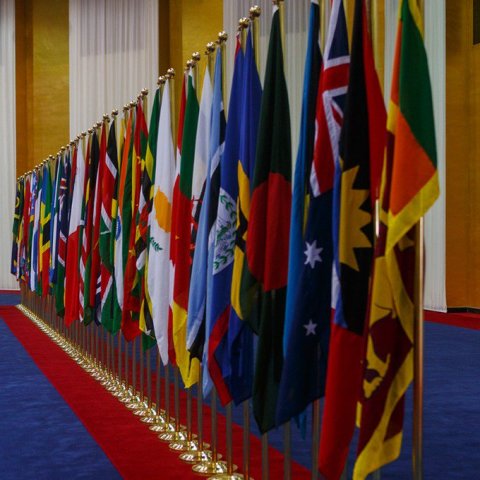
The British government announced that it would withhold discretionary funding from the Commonwealth Secretariat until the organisation overhauled its financial systems. Following similar moves by New Zealand and Australia, the decision threatened to push the organisation further into an acute financial crisis and came amid mounting opposition to a second term of office for the Commonwealth secretary-general, Patricia Scotland. She would be the first incumbent not to serve a second term.
The latest biennial report from the Secretariat outlined the depth of the funding crisis: from core funding of nearly £52m in 2012-13, the organisation expected this to fall to £32.3m in 2018-19. It said: ‘The decline is essentially in the Commonwealth Fund for Technical Co-operation (CFTC), which is reliant on voluntary contributions from member countries.’ The CFTC, which is the aid and development budget of the Commonwealth, accounts for most of this decline, more than halving from 2012-13 to £15m by 2017-18. The UK provides £4.7m a year of CFTC contributions and is the largest donor.
The withdrawal of discretionary funding by the Foreign & Commonwealth Office followed the release of a report by auditors that looked at a controversial consultancy contract awarded to the company of Lord Patel of Bradford, a friend of Lady Scotland and fellow former Labour minister. The BBC reported in late January that the Secretariat’s internal auditors had accused her of ‘circumventing’ the normal procedure of putting the lucrative contract to review operations at the Secretariat out to competitive tender.
The audit committee’s report (dated last November) said Kamlesh Patel’s company, KYA Global, was ‘apparently insolvent’ at the time with debts of more than £40,000. It also said the Secretariat had been unable to provide the auditors with the KYA’s final report setting out its recommendations. The auditors found there had been 50 occasions between 2015 and 2018 when normal procurement rules had been waived by the Secretariat, though some predated Scotland’s appointment in April 2016.
New Zealand had suspended its NZ$4.5m (£1.5m) contribution before the UK’s decision amid concerns about ‘future governance’, according to Jacinda Ardern, though the prime minister played down its grievances as ‘nothing to write home about’. Interviewed on Newstalk ZB radio, Don McKinnon, a former Commonwealth secretary-general and deputy prime minister of New Zealand, diplomatically acknowledged ‘a number of bumps in the road’ and the organisation’s ‘reputation slipping’ since Scotland took office and said it was ‘sad’ that several countries had withheld funds, especially for the loss of the Commonwealth’s aid capacity.
A confidential report seen by the UK newspaper Eastern Eye suggested the ‘baseless and inaccurate’ allegations were part of a ‘sustained campaign’ against Scotland and fiercely rebutted the claims that procurement rules had been circumvented. Understood to have been written by senior Secretariat staff, the report claimed KYA Global was paid £150,000 – rather than the £252,000 widely reported – for seven months of interviews, surveys and workshops that meant the team earned about £10 an hour. A source said: ‘The truth is that some people are trying to use Lord Patel to stop the Commonwealth’s first black woman chief from being re-elected.’
After much embarrassing publicity for Scotland – including a report detailing concerns within the Secretariat about the need for reform, two payouts for former senior Secretariat staff at employment tribunals, and revelations of a £338,000 refit of her official Mayfair residence – the optimism that accompanied her being named as the first woman to be secretary-general seems to have withered. It seems increasingly likely that a rival candidate will stand against Scotland. A UK government source told The Times that it was looking for an alternative candidate: ‘We’re having conversations with like-minded countries about who that might be. But it would be fair to say we think there needs to be a change.’
The BBC obtained a letter by the British prime minister, Boris Johnson, in January (in his role as current Commonwealth chair-in-office) that revealed a survey of the 53 Commonwealth members had found twice as many states opposed giving Scotland an automatic four-year renewal as supported it. Acknowledging that ‘there is no consensus’ to offer Scotland a second term, the letter suggests a rival candidate might emerge and deferred the decision over the next secretary-general to the Commonwealth heads of government meeting in Rwanda in June.
The Secretariat told the Commonwealth Update: ‘We fully accept the recommendations of the recent KPMG internal audit report on procurement across the 2015-18 financial years. All six of the recommendations were accepted and all but one have been implemented. The remaining recommendation will be implemented by the end of February 2020.
‘The follow-up audit, in April, will test and verify this position. We hope the withheld discretionary funding, which is for the Commonwealth Fund for Technical Co-operation, will then be reinstated, allowing the Commonwealth to continue delivering vital work on behalf of member countries.’
Scotland’s lawyers said the decision to award the contract had been fully justified and complied with procurement procedures at the time. ‘This decision was wholly justifiable and SG Scotland was advised that this complied with the procurement procedures that were in force at the time.’
The law firm, Carter-Ruck, said KYA Global had ‘never been deemed insolvent’, adding: ‘It is false and misleading to say that KYA Global was awarded contracts totalling £252,000. KYA Global was actually awarded two contracts worth £75,000 (plus VAT) each. These contract awards constitute heavily subsidised rates from the fees which KYA Global could have charged the Secretariat.
‘The decision to award KYA Global the contracts has been fully justified in light of the recent success of the Secretariat, which has gone from strength to strength in recent years and has successfully undergone a modernisation process.’
• The Commonwealth Secretariat confirmed on 24 March that the UK’s contribution of £4.7m for the Commonwealth Fund for Technical Co-operation had been received after it implemented the recommendations from the internal audit.



